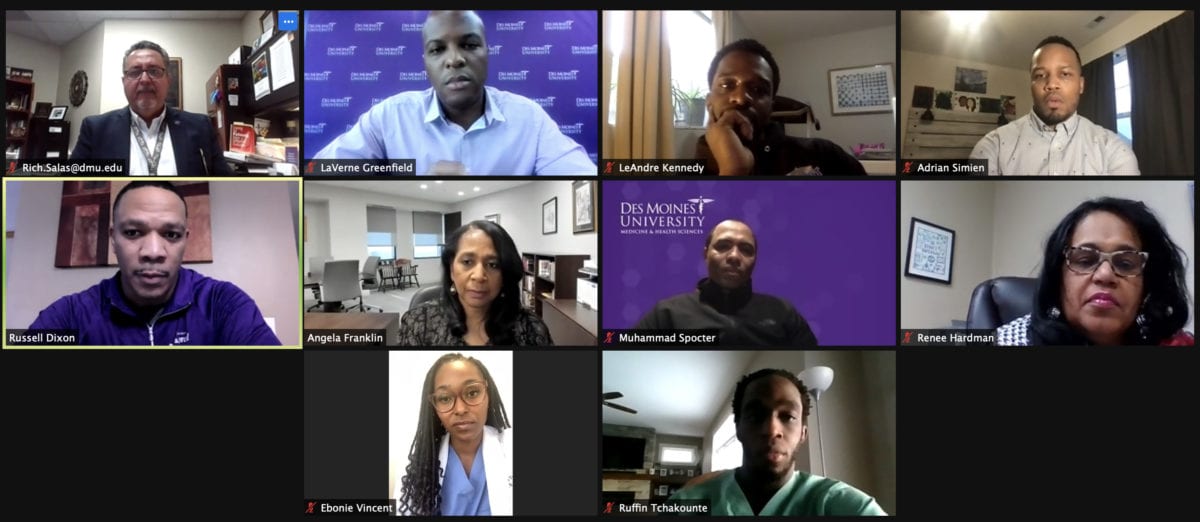During his obstetrics/gynecology residency, osteopathic medical physician Adrian Simien learned that a patient told his attending, behind his back, that “that colored doctor didn’t know what he was talking about.”
As the only female and the only Black person during her podiatric medical residency, Ebonie Vincent was excluded by her peers from study groups and social activities.
As a physician assistant in a rural Iowa hospital, Russell Dixon once had to educate his white colleagues that “colored” and “Negro” are not acceptable ways to refer to their Black patients.
These three Des Moines University graduates participated in a panel discussion hosted by DMU’s Diversity and Multicultural Affairs Office on Feb. 10 as part of the University’s Black History Month events. And while the three individuals reflect diverse backgrounds and experiences – for example, Dr. Vincent grew up in California’s Temecula Valley wine country, graduated from HBCU Hampton University and earned a master’s degree in biomedical sciences before enrolling at DMU, while Dr. Simien struggled to escape gang violence in Compton, CA, and for a while lived out of his car – all three agree that diversity among health care providers is critical to good health care in today’s increasingly diverse society.

Dr. Simien, who is doing his residency at the Indiana University School of Medicine, said the patient’s racist comment was made worse by the fact that other staff didn’t speak up on his behalf. After he told the residency program director what had happened, she initiated extensive training for the staff on implicit bias and cultural respect.
“When you don’t have people there to actually speak up for you, specifically if they’re from the other, the opposite or different race, then that makes things a little bit worse,” he said.
Dr. Vincent, a podiatric physician in Orange County, CA, and co-host of the TLC television series “My Feet Are Killing Me,” recounted frequent instances in which her white residency colleagues exhibited racist attitudes. Among them was the time a male peer described a patient’s condition as “Hispanica hystericas.”
“Oftentimes, I felt like I as literally the only voice saying, ‘Excuse me, what did you say? You’re making a joke which you think is funny, but it’s based off of a stereotype, and it’s not funny and it’s making you biased toward her medical care,’” she said. “If there are more in number that will say, ‘Hey, you can’t say that, this is cultural bias,’ then we can all get behind it and tailor our behavior, our medical biases and our patient care to make it a more equal and diverse environment.”
The panelists emphasized the need for institutions of higher education to increase outreach, recruitment and retention efforts among minority students. They are doing that, too, as mentors.
“Just yesterday I had a Zoom meeting with eighth graders in Compton,” Dr. Simien said. “There are a number of DMU students I mentor as well, and I was able to get three of them in our residency program…I actually love doing it.”
In addition to the Feb. 10 panel, as part of Black History Month, the Diversity and Multicultural Affairs Office is offering all DMU students, faculty and staff access to the film documentary “Black Men in White Coats,” which dissects the systemic barriers preventing Black men from becoming physicians and the consequences for society. Also offered was a series of sessions to raise awareness and understanding of how implicit bias shapes our judgment, decision-making and overall interactions with others.

